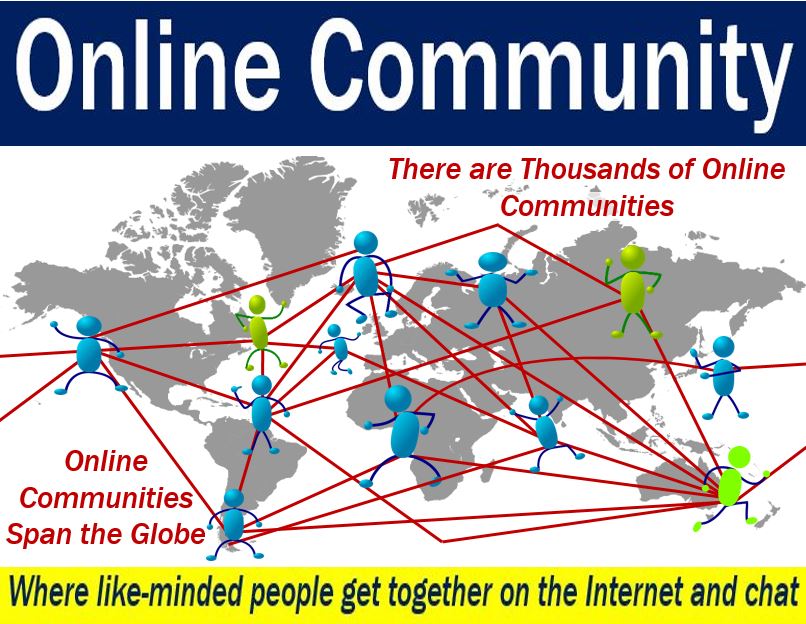Online community – definition and meaning
An Online Community is a group of people who have a common interest and communicate through the Internet. They get together online through websites, discussion boards, instant messaging, email, etc., and pursue their interests over time. An online community is a network of individuals who communicate with one another online.
Online communities offer a platform for individuals to connect over shared passions and interests, regardless of physical location.
We also call it an Internet community. It is a virtual community, i.e., a social network of individuals who interact online.
‘Online,’ in this article, means ‘with an Internet connection.’
According to the Cambridge Dictionary, an online community is:
“A group of people who use a particular internet service or belong to a particular group on the internet.”
Traditional vs. online community
CommonCraft.com says that online communities are communities first and online second.
In fact, everybody is surrounded by communities all the time. For example, we live in a geographical community and work in a professional community.
Some of us worship in a temple with a religious community. Our friends represent a social community.
Put simply, wherever individuals share a common interest, there is a community.
Online communities today differ from previous ones in that the participants interact on the Internet. Community members did not interact online before because the Internet did not exist.

One huge difference between online communities and in the offline ones of the past is their geographical reach. Today, for example, an online community may have members from the US, UK, Japan, Australia, and Chile. In fact, members can be from anywhere in the world, as long as they have an Internet connection.
Joining an online community
If you want to join an online community, above all, you must have an Internet connection.
Typically, you must become a member via a specific website. You may also have to tick a box after reading a list of rules and regulations. Ticking the box means that you will comply with those rules.
In some online communities, you can choose to be a lurker or non-public participant. A lurker joins an online community but does not contribute. In other words, the lurker is a bystander or onlooker.
Lurkers contrast with public participants or posters, who openly express their opinions and beliefs.
Johanne Jacobs, a digital strategist, once said the following at a Community Manager Appreciation Day:
“Online communities are not just a random gathering. They’re a group of people who come together for a purpose.
Online community for brand promotion
Companies love online communities. They help promote their brands. They also help businesses keep track of what people are thinking and what the competition is doing.
In a VisionCritical article, Kelvin Claveria wrote that for the marketing executive, there are four types of online communities. There are social, support, advocate, and insight communities.
Below is a synopsis of Claveria’s description of the four types. He wrote about them from a marketing person’s point of view.
-
Social online community
Social communities include social networks like Instagram and Facebook. Twitter is also a social community.
Brands commonly use social communities as part of their marketing strategy. In fact, many companies use this type of community to find out what their rivals are doing.
According to a Social Media Examiner report, 93% of large companies use social communities, namely Facebook.
-
Support Online Community
Support communities enable participants to offer product tips to other customers. This type of community helps companies spend less on customer support.
In fact, more customers are getting answers to their queries at online communities, while fewer are using ‘customer support’ services.
Support communities provide a more structured way of gathering new ideas than social communities. This is because support communities allow brands to monitor service-and-product-related chats.
Eighty-one percent of large companies have a support community, according to Forrester Research.
Online communities can facilitate peer-to-peer learning and knowledge exchange across various domains.
-
Advocate Online Community
This is where brands mobilize their most loyal and passionate customers. This community, which we also call advocate marketing software, may reward members who write glowing testimonials.
Advocate communities are useful for positive word-of-mouth promotion.
-
Insight Online Community
Brand managers carefully select customers for this group. The community consists of consumers who maintain a long-term relationship with the brand.
In other words, it is a community for lifelong supporters of a brand.
Regarding this type of online community, Claveria wrote: “These communities allow companies to gather continuous, high-quality feedback from engaged stakeholders like customers, partners or employees.”
Online communities – key terms and concepts
There are many compound phrases in the world of online communities. A compound phrase is a term that consists of two or more words. Let’s have a look at some of them.
-
Online Community Management
The practice of building and maintaining a healthy digital community.
Example: “She excels in online community management, fostering active engagement among members.”
-
Online Community Platform
A digital space where an online community meets and interacts.
Example: “The new online community platform has greatly improved our ability to network professionally.”
-
Online Community Engagement
The measure of participation and interaction among community members.
Example: “Our latest post significantly boosted our online community engagement.”
-
Online Community Guidelines
The rules and standards set for behavior within an online community.
Example: “Adhering to the online community guidelines ensures a respectful environment for discussion.”
-
Online Community Building
The process of creating and growing an online community.
Example: “Our focus this quarter is on online community building to connect more enthusiasts in our field.”
Video – What is an Online Community?
This educational video, from our sister channel on YouTube – Marketing Business Network, explains what an ‘Online Community’ is using simple and easy-to-understand language and examples.

